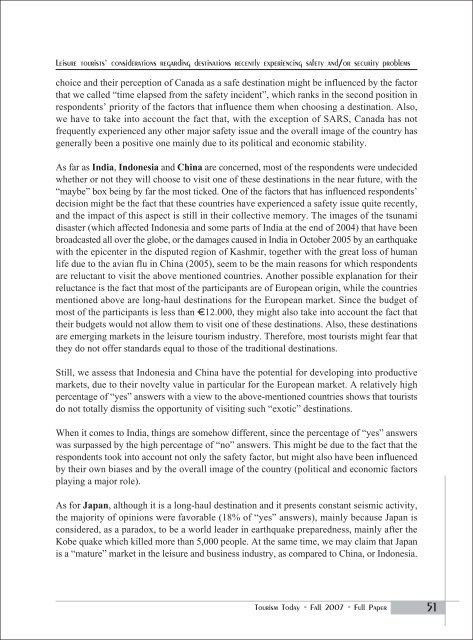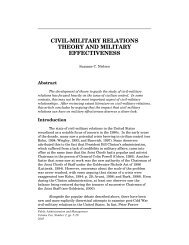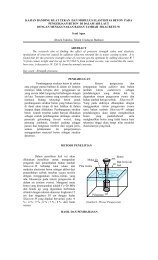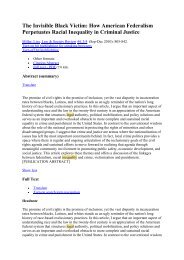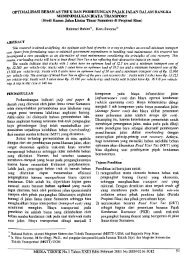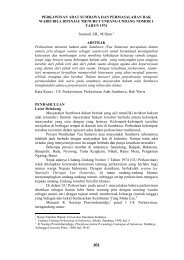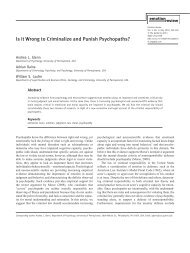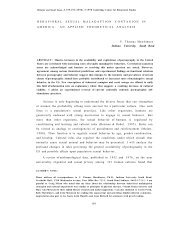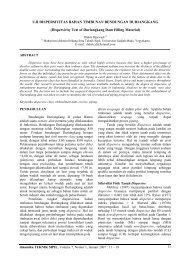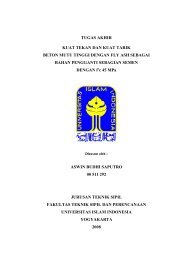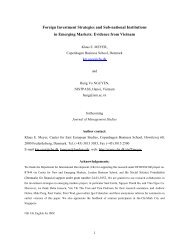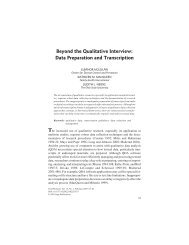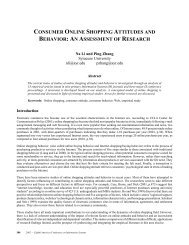Ski – resort and regional development: profile of visitors ... - E-Journal
Ski – resort and regional development: profile of visitors ... - E-Journal
Ski – resort and regional development: profile of visitors ... - E-Journal
You also want an ePaper? Increase the reach of your titles
YUMPU automatically turns print PDFs into web optimized ePapers that Google loves.
Leisure tourists’ considerations regarding destinations recently experiencing safety <strong>and</strong>/or security problems<br />
choice <strong>and</strong> their perception <strong>of</strong> Canada as a safe destination might be influenced by the factor<br />
that we called “time elapsed from the safety incident”, which ranks in the second position in<br />
respondents’ priority <strong>of</strong> the factors that influence them when choosing a destination. Also,<br />
we have to take into account the fact that, with the exception <strong>of</strong> SARS, Canada has not<br />
frequently experienced any other major safety issue <strong>and</strong> the overall image <strong>of</strong> the country has<br />
generally been a positive one mainly due to its political <strong>and</strong> economic stability.<br />
As far as India, Indonesia <strong>and</strong> China are concerned, most <strong>of</strong> the respondents were undecided<br />
whether or not they will choose to visit one <strong>of</strong> these destinations in the near future, with the<br />
“maybe” box being by far the most ticked. One <strong>of</strong> the factors that has influenced respondents’<br />
decision might be the fact that these countries have experienced a safety issue quite recently,<br />
<strong>and</strong> the impact <strong>of</strong> this aspect is still in their collective memory. The images <strong>of</strong> the tsunami<br />
disaster (which affected Indonesia <strong>and</strong> some parts <strong>of</strong> India at the end <strong>of</strong> 2004) that have been<br />
broadcasted all over the globe, or the damages caused in India in October 2005 by an earthquake<br />
with the epicenter in the disputed region <strong>of</strong> Kashmir, together with the great loss <strong>of</strong> human<br />
life due to the avian flu in China (2005), seem to be the main reasons for which respondents<br />
are reluctant to visit the above mentioned countries. Another possible explanation for their<br />
reluctance is the fact that most <strong>of</strong> the participants are <strong>of</strong> European origin, while the countries<br />
mentioned above are long-haul destinations for the European market. Since the budget <strong>of</strong><br />
most <strong>of</strong> the participants is less than f12.000, they might also take into account the fact that<br />
their budgets would not allow them to visit one <strong>of</strong> these destinations. Also, these destinations<br />
are emerging markets in the leisure tourism industry. Therefore, most tourists might fear that<br />
they do not <strong>of</strong>fer st<strong>and</strong>ards equal to those <strong>of</strong> the traditional destinations.<br />
Still, we assess that Indonesia <strong>and</strong> China have the potential for developing into productive<br />
markets, due to their novelty value in particular for the European market. A relatively high<br />
percentage <strong>of</strong> “yes” answers with a view to the above-mentioned countries shows that tourists<br />
do not totally dismiss the opportunity <strong>of</strong> visiting such “exotic” destinations.<br />
When it comes to India, things are somehow different, since the percentage <strong>of</strong> “yes” answers<br />
was surpassed by the high percentage <strong>of</strong> “no” answers. This might be due to the fact that the<br />
respondents took into account not only the safety factor, but might also have been influenced<br />
by their own biases <strong>and</strong> by the overall image <strong>of</strong> the country (political <strong>and</strong> economic factors<br />
playing a major role).<br />
As for Japan, although it is a long-haul destination <strong>and</strong> it presents constant seismic activity,<br />
the majority <strong>of</strong> opinions were favorable (18% <strong>of</strong> “yes” answers), mainly because Japan is<br />
considered, as a paradox, to be a world leader in earthquake preparedness, mainly after the<br />
Kobe quake which killed more than 5,000 people. At the same time, we may claim that Japan<br />
is a “mature” market in the leisure <strong>and</strong> business industry, as compared to China, or Indonesia.<br />
Tourism Today - Fall 2007 - Full Paper<br />
51


